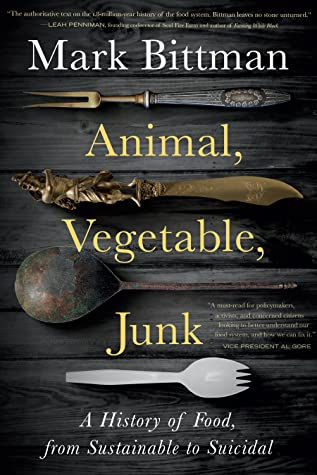Animal, Vegetable, Junk | Book Review
- Hungry4Fitness
- May 6, 2021
- 3 min read
Updated: May 12, 2021
"A brilliant and insightful explanation of the food system. Bittman's writing is succinct and entertaining, and his recommendations are spot on."

Animal, Vegetable, Junk provides the reader with a rare insight into the ‘evolution’ (more accurately devolution) of food. Mark Bittman, a world-renown cookbook author and journalist for the New York Times, delivers a fascinating insight into how food has and continues to shape our lives.
Bittman traces human’s eating habits from our hunter-gather ancestors right through to the contemporary culinary industrial complex. On this edifying tour he brings our attention to the change in human dietary practices. Our ancestors consumed that which nature provided; and, contrary to popular opinion, they weren’t daily walking a fine line of hunger and starvation: the hunter-gather enjoyed a wholesome and staggeringly diverse diet.
According to Tim Spector, author of The Diet Myth, ‘Fifteen thousand years ago our ancestors regularly ingested around 150 ingredients in a week. Most people nowadays consume fewer than twenty separate food items and many, if not most, of these are artificially refined,’ (p19).
Paradoxically, it wasn’t until the rise of agriculture, dated to around 10,000 BC, that humans suffered regular famines. As Bittman points out, it wasn’t until food was weaponised, and production controlled by ruling elites, that famine and starvation became reoccurring and disastrous features of the human diet. Talking of how Stalin used food to control his citizens, Bittman writes that
![‘This was the first instance of a modern government using food as an internal weapon against a rebellious citizenry. But a trend was established. From then on […] famines didn’t strike without warning. They happened only in the context of civil unrest, the absence of democracy, and outright war.’ (Animal, Vegetable, Junk – pp.111-112)](https://static.wixstatic.com/media/8a62f1_d2360c62dbdc48d7b9e746ae3f14406a~mv2.png/v1/fill/w_630,h_243,al_c,q_85,enc_avif,quality_auto/8a62f1_d2360c62dbdc48d7b9e746ae3f14406a~mv2.png)
But Bittman’s book is more than an exposition on the evolution of the human diet. He exposes the horrifying destruction that agriculture – or ‘intensive farming’ – has had on the natural world. Literally billions of square miles of once verdure, nutrient-dense pasture lands have been reduced to lifeless monocrop deserts which have permanently scarred and degraded the landscape. And it’s not just the inevitable desertification of rich ecosystems that is the result of intensive farming practices. There’s also the shocking abuse and wanton waste of natural resources such as water, naturally occurring (but exhaustible) fertiliser, animals and, of course, people.
As Bittman informs us, intensive farming and the industrialisation and commoditization of food led to grotesque human exploitation, abuse and, in many instances, outright slavery.
![‘Black Americans and Indigenous people have each suffered uniquely […] Without oversight, wage theft became routine, as did beatings, sexual harassment, overwork – just about every kind of abuse’ imaginable. (Animal, Vegetable, Junk – pp.126-127)](https://static.wixstatic.com/media/8a62f1_15a2930562d34f0db38f685d0918dc45~mv2.png/v1/fill/w_630,h_220,al_c,q_85,enc_avif,quality_auto/8a62f1_15a2930562d34f0db38f685d0918dc45~mv2.png)
Truly, Bittman’s exposé on the history of our relationship with food is a shocking eye-opener. And as the book’s chief sponsor, Al Gore, says, ‘The climate crisis, COVID-19, and the recent reckoning with systemic and institutional racism have all revealed the many cracks in our global food system.’
But Bittman’s book doesn’t just portend apocalypse, in it he ‘presents the solutions to improve how we grow, distribute, and consume our food. A must read for policymakers, activists, and concerned citizens looking to better understand our food system, and how we can fix it.’
Thus, by reading this book you will enjoy not only an edifying experience of the evolution of human food production, but you’ll also receive actionable information that, if implemented, will enable you to shape a healthy, nutritious diet that is good for you, the people who grow it and for the planet.
Book Blub (click on the image and get your copy)
From hunting and gathering to GMOs and ultra-processed foods, this expansive tour of human history rewrites the story of our species - and points the way to a better future. The history of Homo sapiens is usually told as a story of technology or economics. But there is a more fundamental driver: food.
How we hunted and gathered explains our emergence as a new species and our earliest technology; our first food systems, from fire to agriculture, tell where we settled and how civilizations expanded.
The quest for food for growing populations drove exploration, colonialism, slavery, even capitalism. A century ago, food was industrialised. Since then, new styles of agriculture and food production have written a new chapter of human history, one that's driving both climate change and global health crises.
(As we are very interested in user experience here at Hungry4Fitness, we would be very grateful if you could take a few seconds out of your day to leave a comment. Thanks in advance!)
Blog Author
Adam Priest, former Royal Marines Commando, is a personal trainer, lecturer, boxing and Thai boxing enthusiast.
_p.png)
Comments